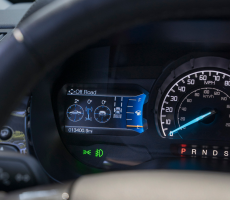— A Ford mpg lawsuit allegedly should be dismissed because the owners who sued apparently don't understand the word "estimated."
That argument is made by Ford in its motion to dismiss the mpg lawsuit which alleges the automaker overstated fuel economy estimates.
Multiple class action lawsuits were consolidated in a Michigan courtroom, but all carry the same core allegation: Ford allegedly sold 2017-2019 vehicles with false mpg ratings that fooled regulators and consumers.
Included are the Ford Ranger and Ford F-150 which were allegedly sold with overstated fuel economy estimates.
The process started when Ford told the Securities and Exchange Commission (SEC) in February 2019 it had "become aware of a potential concern involving its U.S. emissions certification process” and Ford “cannot provide assurance that it will not have a material adverse effect on [Ford].”
The automaker also had opened an investigation after employees reported possible emissions and fuel economy testing problems. Ford said at the time there was no evidence to suggest emissions certification or fuel economy labels were wrong.
According to Ford, the plaintiffs are trying to be chief regulators for fuel economy estimates. The plaintiffs allegedly have found errors in how the Environmental Protection Agency (EPA) fuel economy estimates were reached for Ford vehicles.
"In so doing, Plaintiffs insert themselves into an extensively regulated technical regime that is under the active supervision of the Environmental Protection Agency (“EPA”) and the Federal Trade Commission (“FTC”)." - Ford's motion to dismiss
The automaker says this goes against regulations put in place by Congres and places the plaintiffs in the position of federal regulators. In addition, the motion to dismiss the mpg lawsuit also argues the plaintiffs are trying to enforce the standards of the Energy Policy and Conservation Act of 1975, a job that doesn't belong to vehicle owners.
Attorneys for the automaker say courts across the country have rejected efforts by consumers to treat EPA estimates as guarantees of real-world fuel economy performance.
The EPA refers to the figures on the Monroney label (window sticker) as fuel economy “estimates” because they are approximate figures "generated for the purpose of enabling comparisons between different vehicles based on a common certification process," says Ford.
The EPA allegedly says its fuel economy “ratings are a useful tool for comparing the fuel economies of different vehicles, but may not accurately predict the average [miles per gallon] you will get.” And even in the lab, Ford says the EPA has recognized that different test equipment can lead to different results.
The motion also alleges the EPA has cautioned that using on-road testing "will often yield different results than those obtained under the EPA’s testing process."
According to Ford's motion to dismiss the mpg lawsuit, the plaintiffs rely on the faulty assumption the fuel economy estimates found on the Monroney labels are guarantees of real-world performance.
The plaintiffs also allegedly rely on tests conducted by an unnamed “independent” driver and a “truck blogger[.]”
Ford further says the plaintiffs accuse Ford of “program[ming] its onboard computers with a mileage cheat device [that] would lie about the vehicle’s fuel economy.” But the automaker says this allegation comes from the truck blogger’s “math at the fuel pump,” which allegedly “did not add up to the same number.”
Attorneys for Ford argue the plaintiffs "lack a cognizable injury-in-fact" and were never guaranteed a particular real-world fuel economy performance for their vehicles.
Ford says the owners "received exactly what they bargained for: a vehicle accompanied by fuel economy estimates mandated by the EPA and derived using EPA-authorized testing procedures."
The motion to dismiss also targets a phrase used by the plaintiffs: “true fuel economy.”
Every named plaintiff claims he or she would not have purchased their vehicle, or would have paid less for the vehicle, “[h]ad Ford disclosed the [vehicle’s] true fuel economy[.]”
Attorneys for Ford say the plaintiffs act as if there is a single measure of “true fuel economy," an allegedly flawed premise which renders the class action lawsuit implausible.
The automaker then references how the EPA explains its “ratings are a useful tool for comparing vehicles when car buying, but they may not accurately predict the fuel economy you will get.”
The Ford mpg lawsuit was filed in the U.S. District Court for the Eastern District of Michigan, Southern Division.
The case is titled, In RE: Ford Motor Co. F-150 and Ranger Truck Fuel Economy Marketing and Sales Practices Litigation.

